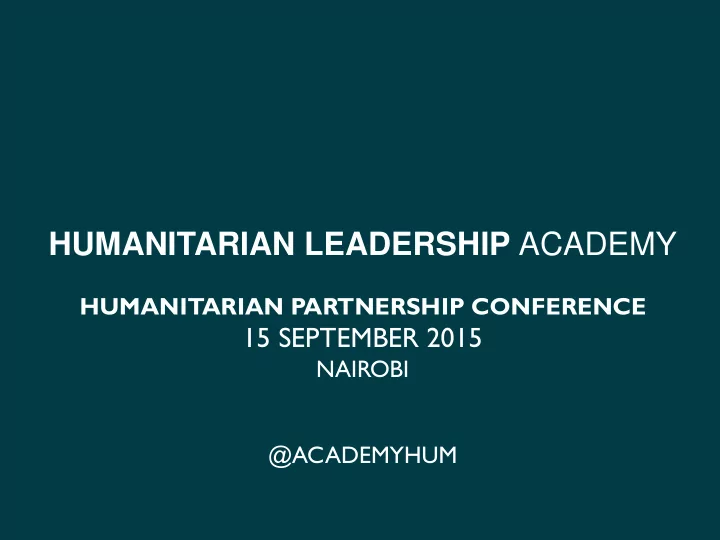

HUMANITARIAN LEADERSHIP ACADEMY HUMANITARIAN PARTNERSHIP CONFERENCE 15 SEPTEMBER 2015 NAIROBI @ACADEMYHUM
Localisation is the future of humanitarian aid HUMANITARIAN LEADERSHIP ACADEMY
Humanitarian crises are becoming more frequent, widespread and complex HUMANITARIAN LEADERSHIP ACADEMY
In 2014, only 18% of all humanitarian funding was received directly by NGOs, and only 1.6% by local NGOs. HUMANITARIAN LEADERSHIP ACADEMY
It is top-down, uncoordinated and focussed on response, orientated around a small number of international Global North based agencies. HUMANITARIAN LEADERSHIP ACADEMY
The Humanitarian systems lacks enough qualified and professional staff Half of all humanitarian field staff work for NGOs and 95% of INGO staff are country nationals HUMANITARIAN LEADERSHIP ACADEMY
HUMANITARIAN LEADERSHIP ACADEMY
The World Humanitarian Summit consultations have highlighted the importance of supporting and strengthening local actors , and reorienting the humanitarian system toward a more localised approach that supports and facilitates community-level relief and recovery efforts HUMANITARIAN LEADERSHIP ACADEMY
WE NEED TO ADDRESS : • A lack of investment in or ad hoc unsustainable financial models for learning and development opportunities How as a sector we measure the quality and impact of learning • to build market recognition on what works, and how as responders and organisations we can access credible learning opportunities • The lack of knowledge and evidence about what really works, globally and nationally • How professionalisation of the work force can be developed at all levels of the response, and scaled up to build the future generation of humanitarians at national and regional level, including recognition of skills and resources available in non-traditional partners HUMANITARIAN LEADERSHIP ACADEMY
Our mission is to empower people around the world to prepare for and respond to crises in their own countries HUMANITARIAN LEADERSHIP ACADEMY
HUMANITARIAN LEADERSHIP ACADEMY
IN THE NEXT FIVE YEARS… Establish ten centres reaching communities in over 40 countries . The first three • centres will be in Kenya, the Philippines and the Middle East. We will then open centres across Africa, Latin America, Asia, and Europe; • Reach 100,000 people from over 50 countries with quality assured learning and development products and services, equipping them with essential skills to respond effectively to disasters; Create a digital platform with local web portals, including a marketplace of online • courses, training tools, learning materials, translation and other services for trainers, leaders and responders; • Create over 100 case studies of disaster programming and capacity building initiatives that will help promote best practice in a wide variety of settings. We’ll translate this into local languages and disseminate it via the most appropriate resources to ensure that information is shared consistently and effectively; Recognise the skills of 150,000 responders , particularly those from disaster-prone • countries; • Create partnerships with organisations around the world, to ensure a more coherent, united and efficient system for learning within the humanitarian sector with sustainable and accessible professional development opportunities to drive the sector towards excellence. HUMANITARIAN LEADERSHIP ACADEMY
The Kenya Academy Centre ACROSS TWO PLATFORMS Academy on the ground (Academy Centres and partners) Academy Digital (including a Resource Centre, an online marketplace for learning and development opportunities, as well as a space for communities of practice to flourish) In addition we will support relevant innovations at national and global level, drawing on examples of best practice emerging from other sectors. HUMANITARIAN LEADERSHIP ACADEMY
ACADEMY PRODUCT EXAMPLES: • Project management product: PMD pro-starter • Certificate in Emergency Preparedness and Response, Kenya • Certified Trainer Course HUMANITARIAN LEADERSHIP ACADEMY
Indicative Kenya ACTIVITIES Milestones Launch recruitment of Academy Director Mid August 2015 Initiate needs assessment : country level End August 2015 Initiate host partner selection process (expression of interest letter) Mid August 2015 Select host partner and negotiate Hosting and Support Agreement Mid October 2015 Needs Assessment Completed End October 2015 Advisory Group members agreed and first meeting Mid November 2015 Strategic planning Workshop - output is Strategy and Plan Early December 2015 Launch event Mid January 2016 HUMANITARIAN LEADERSHIP ACADEMY
WHAT DOES SUCCESS LOOK LIKE? Kenyan and East African individuals can more easily access quality • learning opportunities Kenyan and regional organisations will have improved capacity to • invest in the learning and development • From local to global, knowledge and best practice will be easily shared, benefiting the local sector as a whole • Through connected communities of practice, responders will be able to better connect with other practitioners in person or virtually A more defined career paths and recognition of non-academic • skills and experience, contributing to a more professional East African workforce HUMANITARIAN LEADERSHIP ACADEMY
The scale of the global challenge can only be met with collective action. Let us be the generation of humanitarians, from across sectors, who join together and make localisation in Kenya, and other places vulnerable to crisis, a reality. HUMANITARIAN LEADERSHIP ACADEMY
Want to know more about the Academy? Live twitter Q&A with Academy Directors on Thursday 17 September @AcademyHum Come to our presentation with the Kenyan Institute of Management tomorrow Follows us on twitter @AcademyHum Sign up to our newsletter on our website: humanitarianleadershipacademy.org/
HUMANITARIAN LEADERSHIP ACADEMY
Recommend
More recommend